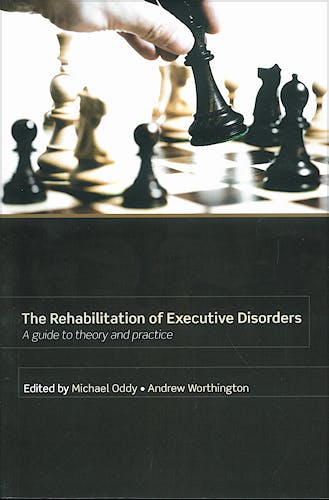

No hay productos en el carrito



The Rehabilitation of Executive Disorders. a Guide to Theory and Practice
Oddy, M.
1ª Edición Octubre 2008
Inglés
Tapa blanda
363 pags
1000 gr
16 x 23 x 2 cm
ISBN 9780198568056
Editorial OXFORD
LIBRO IMPRESO
-5%
93,72 €89,03 €IVA incluido
90,12 €85,61 €IVA no incluido
Recíbelo en un plazo de
2 - 3 semanas
Description
- Includes state of the art chapters on best practice in the rehabilitation of executive disorders, helping the reader to evaluate their own practice and decide whether it is consistent with current best practice
- Based where possible on evidence of efficacy, providing a summary of best available evidence to guide practice
- Where the evidence is lacking based on the theoretical understanding of executive disorders, promotes a rational approach to practice, showing usefulness of theory and suggesting new applications
- Includes chapters exploring the potential uses of information technology in rehabilitation of executive disorders, enabling the reader to consider how they could incorporate the use of such technology in their own practice to the benefit of their clients
Executive disorders represent the most common and most troubling consequence of brain injury. These are disorders of the most sophisticated type, and notoriously difficult to assess, understand and rehabilitate.
This book provides a concise and accessible review of best practice in the rehabilitation of executive disorders, that is, the ability to plan and execute actions and control behaviour. The book covers a wide range of approaches to the rehabilitation of executive disorders including potential uses of modern technology.
The first section looks at theoretical approaches to executive disorder. In the second part of the book, clinical advice is offered for treating disorders. The final section looks at professional issues, such as the impact of new legislation, risk assessment, and the involvement of the family in rehabilitation.
With chapters written by leading researchers and clinicians, the book provides
a comprehensive guide to these complex disorders.
Readership: Clinical psychologists/neuropsychologists, neurologists;
specialists in rehabilitation medicine; speech and language therapists.
Contents
Part 1 - Theoretical Developments
1. Rehabilitation of frontal lobe dysfunction: a working framework , Donald
Stuss
2. Cognitive reserve , Karen L Siedlecki & Yaakov Stern
3. Motivation following brain injury , Michael Oddy, Andrew Worthington &
Elizabeth Francis
Part 2 - Rehabilitation
4. Rehabilitation of executive functioning: an overview , Jonathan Evans
5. Rehabilitation for prospective memory problems resulting from acquired brain
injury , Jessica Fish, Tom Manly & Barbara A Wilson
6. Beyond the shopping centre: using the Multiple Errands Test in the assessment
and rehabilitation of multitasking disorders , Nick Alderman & Dawn Baker
7. Assessing and treating aggressive behaviours in persons with dysexecutive
symptoms , John Freeland
8. Managing anger: a practical approach , Helen O'Neill
9. The impact of executive function impairments on communication , Sinead Corkery
& Mandy Fairweather
10. Physiotherapy approaches with people with executive disorders , Peter Zeeman
11. Rehabilitation of everyday living skills in the context of executive disorder
, Andrew Worthington & Jacky Waller
12. Vocational rehabilitation and executive disorders , Andy Tyerman
13. The use of Smart Technology in the management of and rehabilitation of executive
disorders , Roger Orpwood
14. The use of Virtual Reality in the assessment and rehabilitation of executive
disorders , Paul Penn, David Rose & David Johnson
Part 3 - Professional Issues
15. Psychopharmacological treatment of executive disorders following brain
injury , Hugh Rickards
16. Assessing capacity in clients with executive disorders , Camilla Herbert
17. Assessment and management of risk associated with executive dysfunction
, Andrew Worthington & Nicola Archer
18. The family and executive disorders , Michael Oddy & Camilla Herbert
19. Training staff to work with clients with executive disorder , John McCrea
& Rashmi Sharma
20. A personal account , Chloe Cook
Authors, editors, and contributors
Edited by Michael Oddy, Director of Clinical Services and
Consultant in Neuropsychology and Rehabilitation, Brain Injury Rehabilitation
Trust, Horsham, UK and
Andrew Worthington, Consultant in Neuropsychology and Rehabilitation,
Brain Injury Rehabilitation Trust, Birmingham, UK
Contributors:
Nick Alderman, Kemsley National Centre for Brain Injury Rehabilitation, Northampton,
UK
Nicola Archer, Brain Injury Rehabilitation Trust, Birmingham, UK
Dawn Baker, Kemsley National Centre for Brain Injury Rehabilitation, Northampton,
UK
Chloe Cook, c/o Brain Injury Rehabilitation Trust, Horsham, UK
Sinead Corkery, Brain Injury Rehabilitation Trust, York, UK
Jonathan Evans, Section of Psychological Medicine, Glasgow University, Gartnavel
Royal Hospital, Glasgow, UK
Mandy Fairweather, Brain Injury Rehabilitation Trust, York, UK
Jessica Fish, MRC Cognition and Brain Sciences Unit, Cambridge, UK
Elizabeth Francis, Disablement Services Centre, Medway Maritime Hospital, Gillinigham,
UK
John Freeland, Brain Injury Rehabilitation Trust, York, UK
Camilla Herbert, Brain Injury Rehabilitation Trust, Horsham, UK
David Johnson, School of Psychology, University of East London, London, UK
Tom Manly, MRC Cognition and Brain Sciences Unit, Cambridge, UK
John McCrea, Thomas Edward Mitton House, Milton Keynes, UK
Michael Oddy, Brain Injury Rehabilitation Trust, Horsham, UK
Helen O'Neill, Kemsley Division, St Andrew's Hospital, Northampton, UK
Roger Orpwood, Bath Institute of Medical Engineering, The Wolfson Centre, Royal
United Hospital, Bath, UK
Paul Penn, School of Psychology, University of East London, London, UK
Hugh Rickards, Department of Neuropsychiatry, Queen Elizabeth Psychiatric Hospital,
Birmingham, UK
David Rose, School of Psychology, University of East London, London, UK
Rashmi Sharma, Thomas Edward Mitton House, Milton Keynes, UK
Karen L Siedlecki, Cognitive Neuroscience Division, Taub Institute, Columbia
University, New York, USA
Yaakov Stern, Cognitive Neuroscience Division, Taub Institute, Columbia University,
New York, USA
Donald Stuss, The Rotman Research Institute, Baycrest Centre, Toronto, Canada
Andy Tyerman, Community Head Injury Service, The Camborne Centre, Bedgrove,
Aylesbury, UK
Jacky Waller, Brain Injury Rehabilitation Trust, Birmingham, UK
Barbara A Wilson, MRC Cognition and Brain Sciences Unit, Cambridge, UK
Andrew Worthington, Brain Injury Rehabilitation Trust, Birmingham, UK
Peter Zeeman, Center for Rehabilitation of Brain Injury, University of Copenhagen,
Denmark
© 2025 Axón Librería S.L.
2.149.0